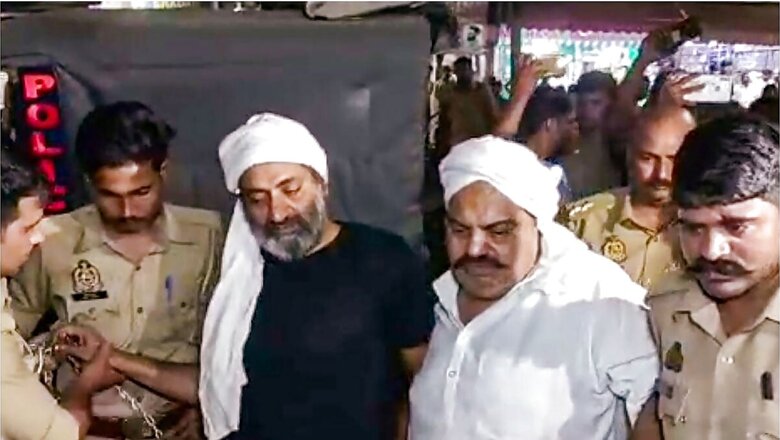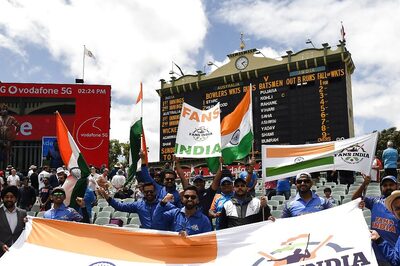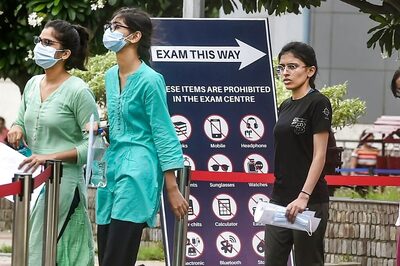
views
The killing of criminal-turned-politician Atiq Ahmed and his brother Ashraf has three angles. One, he was allegedly killed by antisocial elements, probably affiliated with the Samajwadi Party (SP), who feared the duo would spill the beans under the pressure of police interrogation. Two, a bunch of youths, whose families were tormented by the duo exacted revenge. Three, the assailants were Hindutva activists because they allegedly chanted ‘Jai Shri Ram’ while shooting the victims. Your angle depends on your ideological position. But, all three angles reflect poorly on Uttar Pradesh Police. Regardless of which of the three possibilities is true, the men in khaki should have been able to protect the former gangsters who would probably have been convicted and sentenced, also giving away vital information about their racket, which would lead to an unravelling of their evil empire. But if the third is true, the state — the legislature, the executive and the judiciary — have a lot to worry about and get its act together in delivering justice to one and all.
In 1979, when he was 17, Atiq Ahmed was accused in a case of murder in Prayagraj. Soon, he started running a network comprising dozens of goons in the state. His dominance gradually spread to the surrounding areas — Phulpur and Kaushambi. In 1989, when his archrival, Shaukat Elahi, was killed in a police encounter, Ahmed became the undisputed honcho of Uttar Pradesh’s underworld.
The same year, the recently killed former hoodlum contested and won his first election from the Allahabad West Assembly seat as an independent candidate. He won the Vidhan Sabha seat five times in a row from 1989 to 2002, on the first three occasions as an independent and then on the ticket of the SP and finally as an Apna Dal candidate. A year after his last win as an MLA, Ahmed went back to the SP and won the Phulpur Lok Sabha seat in 2004. He had to vacate the Allahabad West Assembly constituency, which led to a chain of events leading to the murder of Bahujan Samaj Party (BSP) MLA, Raju Pal, in 2005. On February 24, this year, one of the main witnesses in the incident, Umesh Pal, was murdered.
Atiq Ahmed was arrested in 2005 for the murder of Raju Pal. He got bail after three years. Whether in or out of jail, he maintained his sway over the underworld of Uttar Pradesh. He ensured that his associates of the netherworld were protected. In 2007, while he was in jail, Ahmed was accused of shielding his men who were allegedly involved in the gang rape of some girl students of a madrassa. This sparked outrage and the Samajwadi Party expelled him.
Atiq Ahmed then lost the 2009 parliamentary election as an Apna Dal candidate from Pratapgarh, but the electoral defeat did not mean that his clout had waned. In the 2012 Uttar Pradesh Assembly elections, once again, he lost the election to Pooja Pal, the wife of Raju Pal. He then contested the 2014 Lok Sabha elections from Shravasti as a Samajwadi Party candidate but lost again.
Meanwhile, the Allahabad High Court reprimanded UP Police for not arresting Ahmed. He was then arrested; and since then, was in jail. On December 14, 2016, Atiq Ahmed and his henchmen allegedly assaulted the employees of Sam Higginbottom University of Agriculture, Technology and Sciences (SHUATS) for taking disciplinary action against two students who were caught cheating. The institution’s authority had debarred them from taking examinations any further. The video of Ahmed beating a teacher of SHUATS and its employees had gone viral that year on social media.
On February 10, 2017, the Allahabad High Court went through the criminal history of Ahmed and directed the Superintendent of Police of Allahabad to arrest all the suspects in the case. The police arrested Ahmed on February 11, after which he was remanded to 14-day judicial custody.
In March 2017, when Yogi Adityanath became the Chief Minister of UP, he promised to launch a crackdown on the ‘empire of criminals.’ Atiq Ahmed was taken from his bastion Allahabad to Deoria Jail. He, however, continued to run his network of hooligans from jail. His henchmen are said to have kidnapped a businessman, Mohit Jaiswal, and brought him to jail. He was made to sign some property papers and was also beaten mercilessly. After the incident, Ahmed was taken to Bareilly Jail where the jail superintendent was reportedly too intimidated by his presence.
In April 2019, under the strict protection of the police, the Yogi government moved Ahmed to Naini Jail in Prayagraj. By this time, the Supreme Court had given its verdict in the Deoria Jail case and ordered Ahmed to be moved to Sabarmati Jail in Gujarat.
Atiq Ahmed had more than 100 cases registered against him, including extortion, kidnapping and murder. It’s a terrible commentary on the state of justice delivery mechanism of the country that, after all those cases piling up over many years, his first conviction came in March this year for kidnapping Umesh Pal, a witness to Raju Pal’s murder. The sentence was pronounced a month after the murder of Umesh Pal, the key witness in the case of MLA Raju Pal’s murder in 2005, in 2023.
Atiq Ahmed’s men had also shot dead two police security guards outside their Dhumanganj residence on February 24, an act that was caught on camera. On February 25, a case was registered against Ahmed, Ashraf, Ahmed’s wife Shaista Parveen, two sons, Guddu Muslim and Ghulam, and nine others, based on a complaint lodged by Umesh Pal’s wife Jaya Pal. Ahmed and his brother Ashraf were brought to Prayagraj for trial in connection with the 2005 Raju Pal murder case. A team of UP Police brought Atiq and Ashraf from the high-security Sabarmati Central Jail in Ahmedabad, Gujarat, to Prayagraj on March 26 to produce them before a court in the case of the kidnapping of Umesh Pal.
Ahmed and two others were sentenced to life imprisonment. Before three young men — identified as Luvlesh Tiwari, Sunny and Arun Maurya — shot Atiq and his brother Ashraf dead in the hospital premises on the night of April 15, Atiq had expressed his apprehension that he could be killed, but he did not expect it would happen within 72 hours after his son Asad was ‘encountered’.
A scrutiny of the footage of killing the duo shows nobody was shouting ‘Jai Shri Ram’ at the time of firing the shots. When the visibly panicked policemen who had dispersed regained their composure and rushed to grab the assailants, that was when the chant was heard. Interestingly, the camera of a news agency lost focus when the shots were fired while a media house followed the attackers. Yet, the media house in its subsequent report claimed misleadingly that Luvlesh Tiwari, Sunny and Arun Maurya were screaming ‘Jai Shri Ram’ even as they were firing.
The difference between the timings of the sloganeering could establish the attackers’ political motivation and hence, is critical. Were they instructed to project the Yogi government or Hindus in poor light, an order from their handlers that they had forgotten at the spur of the moment?
The slogan might have otherwise been an afterthought to garner sympathy of the majority community. Given the plethora of anti-Hindu laws enacted since Jawaharlal Nehru’s era up to the 10 years of the UPA government, which even the Narendra Modi government is reluctant to fiddle with, and given the posse of judicial interventions only in Hindu ways of worship — from Sabarimala to Mahakaleshwar — this hypothesis has many takers. If they did it to make a statement of Hindutva, then one would be impelled to observe that at least a handful of Hindus have given up on the state and turned law unto themselves. The state’s callous regard for the truths of cases, the community’s sensitivities and human and religious rights invited this situation. But if the attackers’ enmity with Atiq Ahmed and his brother was vengeance, even then supporters of vigilante justice would have a soft corner for them.
Finally, if there is a tacit order for the policemen to let the malcontents be eliminated by design, the courts must note this could be an aftermath of the brazen moral support they extended to rioters while condemning the government of the province in cases related to the anti-Citizenship Amendment Act (CAA) riots in the recent years. When the executive realises the judiciary will only hand it down a raw deal, it does have the means to pre-empt the hostile black coats. And even the best lawyer of the Leftist cabal will struggle to establish the extra-constitutional elimination of hardened criminals is deliberate.
The era of fighting a wrong with another to get things right has begun. Whodunnit is secondary. Chasing and catching a vigilante does not get rid of the reason that created the maverick justice seeker. Why the ilk of Atiq Ahmed is falling by dozens in Uttar Pradesh is the question the state must ponder over and address its record of injustices that led to this mess. Lest more provinces get ‘inspired’ and India should prove a failed state.
The author is a senior journalist and writer. Views expressed are personal.
Read all the Latest Opinions here


















Comments
0 comment